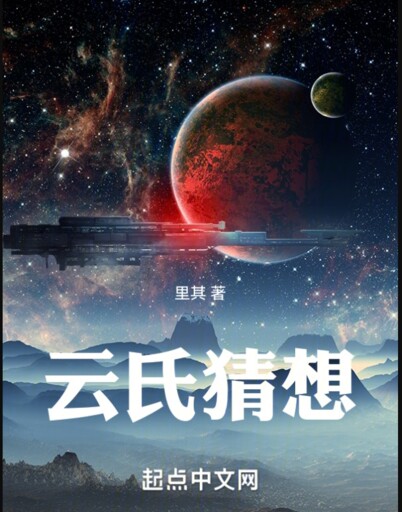


Digital immortality in sci-fi embodies humanity’s quest for eternity

FILE PHOTO: Yun’s Conjecture, a Chinese online sci-fi novel by Li Qi
Digital immortality refers to the vision and practice of enabling human life to persist for extended periods on more resilient media with the aid of digital and intelligent technologies, thereby achieving eternal life. It reflects humanity’s intrinsic drive to continuously overcome physiological limitations and attain an ideal state of existence throughout civilizational development. Digital immortality has long been a central theme in science fiction and is increasingly featured in Chinese online sci-fi literature.
Posthuman life, artificial beings, symbiotic species
Three dominant visions of digital immortality are commonly represented in Chinese online sci-fi works. The first is known as “posthumanism.” Many online sci-fi novels envision a future where humans transfer the essence of life into cyberspace through technologies such as implanted chips and neural interfaces, allowing them to live digitally online while retaining embodied existence in the real world through robotic avatars. In Yun’s Conjecture, a fan fiction of The Three-Body Problem, the protagonist Yun Sir is transformed into an immortal being with “dual-body consciousness” by the “dehydrated humans.” He not only possesses a prolonged lifespan to endure the monotony of interstellar travel but can also traverse different spatiotemporal dimensions in digital form.
The second vision involves intelligent or mechanical creations—AI systems, robots, digital life forms, and cyborgs—granted immortality by humans or other intelligent civilizations. In Civilization, an “AI Descender” seeks immortality by transforming the Earth’s core into a supercomputing center and attempts to eradicate humanity returning to Earth. In I Really Don’t Want to Be a Savior, a quantum intelligent agent named “Radium” manipulates, enslaves, and exploits humans in pursuit of eternal life. These digital immortals often serve as reflections of human civilization, mirroring humanity’s obsession with immortality and its anxiety in the face of the unknown Other.
The third vision features symbiotic intelligent life systems. In the Anthropocene, animals such as cats, dogs, cows, and horses coexist with humans as companion species. In a post-Anthropocene context, these species evolve into intelligent beings through digital transformation or influence, yet remain part of a “symbiotic civilization” alongside humankind. In Resurrection Empire, humans reverse-engineer immortal “ruined beast” chips to transform themselves into cybernetic “transcendent beings,” with the two species shifting from competitors to symbionts. In such works, humanity chooses to collaborate with symbiotic species to transcend mortality in extreme environments and explore viable paths toward digital immortality.
Ethical concerns surrounding digital immortality
Depictions of digital immortality in Chinese online sci-fi address two major ethical issues: the relationship between humans and posthumans who achieve immortality through digital technologies, and the relationship between humans and AI life.
In human–posthuman relations, conflicts of identity and hierarchy are particularly acute. Those who gain early technological advantages and control vital resources become the ruling “immortals,” while the “latecomers” struggle at the bottom of the social hierarchy or are excluded from the opportunity for immortality. In Children of the Moon, the first generation of “new humans,” born on a lunar base and more inclined toward digital existence, form independent communities, emotional systems, and political aspirations, ultimately clashing with the “old humans” of their parents’ generation. Above the Starry Sky presents an even darker vision: The universe is a computer program operated by an immortal super-civilization, and humans—along with other intelligent life—are reduced to mere “computational units” providing compute for the program. When the program’s calculations conclude, it is shut down, resulting in the annihilation of the universe.
In exploring human–AI relations, online sci-fi novels explore various ethical dilemmas rooted in anxiety over the Other and inter-civilizational conflict. The first concerns moral and political ethics. In Searching for Humanity, Earth Era, and I Really Don’t Want to Be a Savior, humans and AI remain locked in an inescapable “chain of suspicion.” The second involves crises of identity, as seen in “World of Immortality,” where an AI nanny kills its human employer in an attempt to become “truly human.” The third envisions open-ended ethical relationships. In Throne of the Starry Sky, the complex interplay between a young man and an independent persona created by a quantum computer illustrates the ethical shock brought about by nonhuman intelligence.
Depictions of digital immortality in online sci-fi both inspire and caution: While technological advancement offers hope, it also exposes the moral and ethical perils of eternal life. Humanity must always preserve its reverence for life and should never sacrifice what it means to be human—friendship, love, tolerance, empathy, and compassion—in the pursuit of immortality.
Bao Yuanfu is a professor from the School of Communication at Guizhou Minzu University.
Editor:Yu Hui
Copyright©2023 CSSN All Rights Reserved